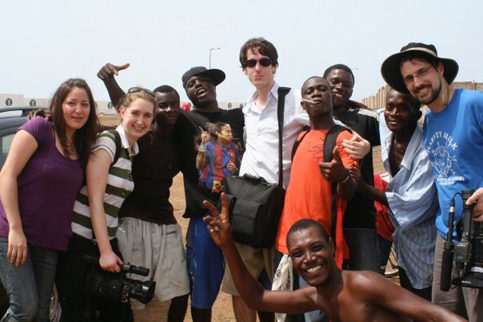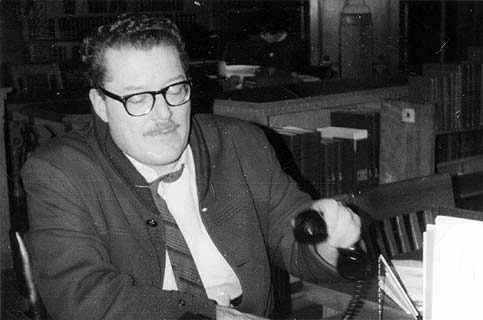
courtesy of Blake Sifton
Aboard a vehicle called the Rhino Runner, four journalists pass through some of the most dangerous areas of Baghdad. It’s August 2, 2009, and they’re travelling to the American military’s Forward Operating Base Warhorse. They’re surrounded by highly trained soldiers. They don’t feel so unsafe. Recounting the moment early the next day, Tom Hewitt wrote on the group’s blog, Short Timers, to which the quartet posted about their experiences: “It seemed again like the war was a concept that existed someplace far away.”
Suddenly the convoy halts. The reporters become anxious. After a few minutes, the turret gunner tells them an improvised explosive device (IED) has detonated on the route ahead of them. The mood inside the vehicle shifts. “The realization that we were minutes away from having triggered an IED triggered a reaction that came like a flood,” wrote Hewitt. “This is a war.”
Three of the four—Hewitt, Jennifer Canfield and Jessica Hoffman—are actually fourth-year students at the University of Alaska Fairbanks (UAF). This past August, they travelled with their professor, Brian O’Donoghue, to the front lines in Iraq as part of an extreme school project: to spend one month embedded primarily with Alaska’s Fort Wainwright 1-25th Stryker Brigade Combat Team, writing stories, shooting videos and recording audio. The idea, according to O’Donoghue, who is also the head of the department of journalism, was to give them a taste of what it’s like to be war correspondents: “Nothing is more real than covering a war.”
But how real is too real?
Sending university kids into a war zone is obviously controversial—exploding IEDs, live gunfire and the threat of abduction are all major concerns. “There’s definitely always the possibility that things will go catastrophically wrong,” says Hewitt. But O’Donoghue—whose international reporting experience includes serving as a United Press International photo stringer in Cairo during the peace talks between Israel and Egypt in 1979—argues that as long as precautions are taken, there’s no reason not to send students around the world chasing stories. O’Donoghue remembers a student saying it was as though they had gained a year’s worth of newsroom experience while on this trip. “They were meeting daily deadlines. They were grappling with communication difficulties. They were being challenged to identify and report coherent stories in the midst of chaos.”
Like O’Donoghue, Peter Klein, a 60 Minutes producer and professor with the University of British Columbia Graduate School of Journalism, believes giving students the chance to report abroad is necessary, especially since it’s often young journalists who end up covering those stories. “A lot of the veteran journalists don’t want to do it,” he says. “They’ve got families; they don’t want to be away for long periods of time.”
So last year he created an international reporting course that gives 10 students at a time the chance to work abroad for up to two weeks on a multimedia documentary project. Originally a semester-long course, it was expanded to two semesters this year. Klein’s first group of students, nine of whom graduated this past spring, produced a 20-minute doc—Ghana: Digital Dumping Ground, aired on PBS’s Frontline on June 23, 2009—about electronic waste dumps in China, Ghana and India. They did the initial research in Vancouver, then split into three groups, one for each locale (Klein leading the China team), and trekked through computer graveyards where scavengers—often children—burned plastic computer monitor cases and the lead coatings on chips to get at the valuable metals inside. They breathed in toxic plumes of smoke and at times stood next to barrels full of acid used for stripping parts. “The classroom is great, but until you get out there and actually do it, I don’t think you’re learning as much as you can,” says student Allison Cross. “It’s probably one of the best experiences I’ve had in journalism.”
Not every journalism prof thinks it’s realistic or even sensible to shepherd students to hot spots. Klaus Pohle of Carleton University says of embedding students with the military overseas: “That’s not anything you’d want to expose a student to. It’s terribly irresponsible.”
From a practical perspective, there’s also the money issue: the UBC program costs $100,000 a year. The UAF jaunt cost $35,000. But neither students nor the schools had to front the funds. The philanthropic group Mindset Social Innovation Foundation gave UBC a $1 million endowment to fund its program for 10 years. O’Donoghue and his students received a $35,000 grant from the University of Alaska Foundation, which is funded through alumni and outside donations, and, the Stryker Brigade lent everyone helmets and flak jackets, which saved them around $10,000.
As for liability issues surrounding the arguably more dangerous Iraq trip, Hewitt, Canfield and Hoffman each signed a rather alarming-sounding waiver acknowledging the possibility of being kidnapped, tortured or beheaded. The UBC students endorsed a standard university participant agreement.
Even with these documents, O’Donoghue and Klein were on edge throughout their travels. O’Donoghue worried what would happen if one of his students decided to wander off alone through a Baghdad bazaar. He badgered them to remember to wear their helmets. Klein made sure he was the one manning the camera in China’s more dangerous toxic dumps so his students could avoid being attacked by organized criminals in charge of the scavengers. “I ended up filming all of those sections, and we were chased by some goons quite a few times,” he says.
Students also prepared for months before setting foot on foreign soil. The UAF group studied the pros and cons of being embedded with the military at length. One member even attended a National Public Radio war-reporting workshop in Los Angeles. The UBC class took part in a health and safety session where students identified potential problems they might encounter and discussed how to avoid them.
There are even tougher training programs students heading to troubled areas could complete. Before assigning him to Afghanistan in 2006, The Globe and Mail sent now 30-year-old correspondent Graeme Smith on a five-day war zone course in Hampshire, England, as it does with most virgin war correspondents. There, he was taught combat first aid, how to behave in a minefield, how to handle soldier-patrolled checkpoints and what to do if he were kidnapped or taken hostage. “Students could be given that kind of training before they go into a combat zone,” he says. He also notes that those who fret about sending students into dangerous areas are overlooking the fact that many of the American soldiers in the region where the UAF group spent most of its time are not much older than the average undergrad themselves.
While Smith thinks both the UAF and UBC programs offer students important opportunities, he says UBC’s international reporting class may be more useful, since it teaches students how to operate independently in developing countries. “Going on an embed is pretty easy. You’re with the troops.”
Some might wonder why, while newspapers slash foreign bureaus, universities would bother to risk sending students to volatile regions and into unpredictable situations. O’Donoghue counters that journalists are supposed to be bold, relentless story-chasers, and the point of these programs is to cultivate that skill. “It has to do a lot with you,” he says.”Is your world outlook the sort that you shy away from the possibility of risk? Or do you recognize that the odds are in your favour in most circumstances? The burden is on you not to do something stupid.”
About the author
Chelsea Murray was the Online Editor for the Summer 2010 issue of the Ryerson Review of Journalism.

